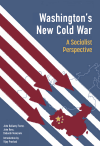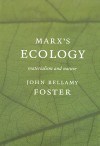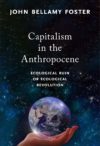
John J. Simon: Socialist Editor, Writer, and Broadcaster
Monthly Review editors remember the life of MR editorial board member John J. Simon (1934–2022), a dedicated socialist, towering figure in radical publishing and broadcasting. | more…

Monthly Review editors remember the life of MR editorial board member John J. Simon (1934–2022), a dedicated socialist, towering figure in radical publishing and broadcasting. | more…

February’s Review of the Month confronts the new irrationalism and its reactionary tendencies, which find their roots in troubling philosophical and historical foundations. The answer, John Bellamy Foster writes, can be found in a return to historical materialism. | more…

This issue’s Review of the Month discusses Marx’s role as the foremost revolutionary critic of bourgeois Enlightenment humanism. To this day, his conception of “the universal metabolism of nature” remains a powerful antidote to the phantasmagoric “dark ecology” posited by today’s posthumanism. | more…

John Bellamy Foster takes readers back to Marx’s understanding of the dialectics of nature and society. As Marx and Engels noted, humanity must not only struggle for the advancement of human freedom, but also the capitalist destruction of the earth. Today, the struggle for freedom and the struggle for necessity coincide everywhere on the planet for the first time in human history, creating a prospect of ruin or revolution. | more…

As the American people delude themselves once more into thinking of the United States as a liberating force for peace in the world, Waging a New Cold War invites us, instead, to think for ourselves. Behind the scenes the plans to wage war have been laid—either by proxy, as in Ukraine, or directly, against the U.S.’s old twentieth-century foes. Waging a New Cold War: A Socialist Perspective makes a strong case that, as the official story is laid out by government propagandists, and as the mainstream media provides cover, the aim of this latest set of American military escapades remains the same as ever: Maintenance of U.S hegemony in the global financial system. Foregrounded with an introduction by Vijay Prashad, this cogent collaboration puts forth three essays that illustrate clearly that, while the Cold War against the Soviet Union ended, the “cold war” against the “enemies” of the United States did not. Furthermore, its authors lay out evidence that the U.S. establishment has been willing to risk nuclear winter—in other words, mutual annihilation—to hold onto economic primacy. And they show that, while Russia and China can each be criticized, justifiably, for their violations of human life and dignity, neither, on its own, threatens the eruption of a Third World War and the end of the human race as we know it. Just in time, we have in our hands an intelligent text that strengthens our struggle against the cynical machinations of the American military behemoth and its propaganda machine. | more…

How are we to understand the origins and historic significance of the concept of ecological civilization? What is its relation to ecological Marxism? And how does all of this relate to the worldwide revolutionary struggle aimed at transcending our current planetary emergency and protecting what Karl Marx called “the chain of human generations”—along with life in general? | more…

More than twenty years after the publication of John Bellamy Foster’s Marx’s Ecology (2000), ecosocialist scholars continue to explore the evolution of Marx’s ecological thinking, from the Greek atomists to his later work on ethnology. | more…

Over the last 11,700 years, during which human civilization developed, the earth has existed within what geologists refer to as the Holocene Epoch. Now science is telling us that the Holocene Epoch in the geological time scale ended, replaced by a new more dangerous Anthropocene Epoch, which began around 1950. The onset of the Anthropocene Epoch is characterized by an “anthropogenic rift” in the biological cycles of the Earth System, marking a changed reality in which human activities are now the main geological force impacting the earth as a whole, generating at the same time an existential crisis for the world’s population. | more…

Time is running out for humanity to avoid a catastrophic planetary tipping point. Widespread mass mobilizations of populations worldwide must fight to bring about revolutionary societal changes and dismantle neoliberal monopoly capitalism, with its reliance on extractive exploitation of our planet’s resources and communities. | more…

Contradicting previous liberal notions of an “end of history,” humanity is now facing unprecedented threats to our species’ survival, but an environmental proletariat to combat them is emerging. | more…

István Mészáros was a global thinker strongly committed to anti-imperialist struggles. In this respect, he allied himself with those fighting for socialist transformation in the Philippines, Nicaragua, Venezuela, Brazil, and elsewhere. He argued that in the descending phase of capitalism there was a “downward equalization of the rate of exploitation,” by which he meant a race to the bottom in wages and working conditions, enforced by a global system of monopolistic competition. | more…

In 1980, the great English historian and Marxist theorist E. P. Thompson wrote the pathbreaking essay “Notes on Exterminism, the Last Stage of Civilization.” Although the world has undergone a number of significant changes since, Thompson’s essay remains a useful starting point in approaching the central contradictions of our times, characterized by the planetary ecological crisis, COVID-19 pandemic, New Cold War, and current “empire of chaos”—all arising from features deeply embedded in the contemporary capitalist political economy. | more…

The rapid financialization of nature is promoting a Great Expropriation of the global commons and the dispossession of humanity on an unprecedented scale. | more…